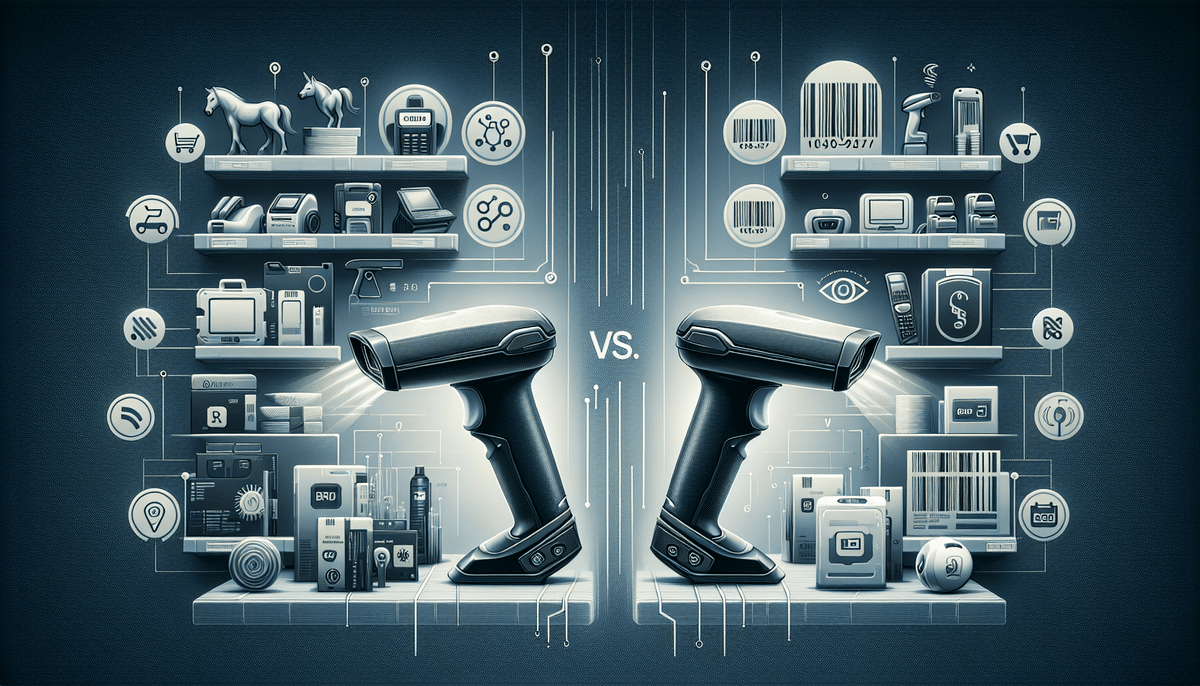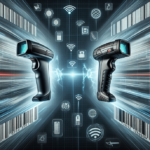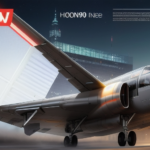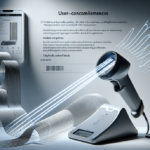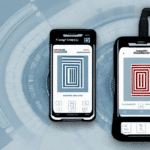Datalogic Gryphon I GD4500 vs Honeywell Xenon 1900g: A Comprehensive Comparison
Choosing the right barcode scanner is crucial for optimizing your business operations. Two leading options are the Datalogic Gryphon I GD4500 and the Honeywell Xenon 1900g. This comprehensive comparison covers design, performance, barcode reading capabilities, ease of use, software updates, durability, pricing, and customer support. By integrating data and insights from industry reports and official sources, we aim to help you make an informed decision tailored to your business needs.
Overview of Datalogic Gryphon I GD4500 and Honeywell Xenon 1900g
The Datalogic Gryphon I GD4500 and Honeywell Xenon 1900g are top-tier barcode scanners renowned for their accuracy and efficiency. These devices cater to various sectors, including retail, healthcare, and manufacturing, ensuring versatility across different operational environments.
The Datalogic Gryphon I GD4500 incorporates motion-sensing technology, seamlessly switching between handheld and presentation modes. This flexibility makes it suitable for both active and passive scanning scenarios. In contrast, the Honeywell Xenon 1900g boasts an extended scanning range, enabling barcode reads from greater distances. Both scanners feature advanced image capture and decoding capabilities, enhancing their utility in diverse business applications.
Design and Ergonomics
Weight and Portability
Ergonomics play a pivotal role in user satisfaction and productivity. The Datalogic Gryphon I GD4500 weighs 6.5 ounces, making it slightly lighter than the Honeywell Xenon 1900g at 7.1 ounces. The Xenon 1900g's larger scan window facilitates easier scanning of bulkier items.
Build Quality and Durability
The Gryphon I GD4500's compact design ensures maneuverability in confined spaces, complemented by a rubberized grip for secure handling in challenging conditions. Conversely, the Xenon 1900g features a rugged build capable of withstanding drops from up to 6 feet, emphasizing durability.
Stand and Feedback Features
Both scanners offer adjustable stands for hands-free operation. The Gryphon I GD4500's flexible stand accommodates various angles, while the Xenon 1900g provides a stable, rigid base. Additionally, the Xenon 1900g includes a vibration mode, offering tactile feedback in noisy environments, enhancing user experience.
Scanning Performance
Scanning Range and Speed
Performance metrics are critical in high-demand environments. The Datalogic Gryphon I GD4500 can scan barcodes from up to 6.5 feet, whereas the Honeywell Xenon 1900g offers a range of up to 33 inches.
In terms of speed, the Gryphon I GD4500 outpaces the Xenon 1900g with a scanning rate of 450 scans per second compared to 240 scans per second. This makes the Gryphon I GD4500 particularly suited for high-volume settings like warehouses and retail stores, where efficiency is paramount.
Imaging Technology
Advanced Imaging Capabilities
Both devices leverage advanced imaging technologies to ensure precise barcode reads. The Gryphon I GD4500 utilizes Datalogic's proprietary "Motionix" technology, facilitating automatic mode transitions. On the other hand, the Xenon 1900g employs Honeywell's "Adaptus Imaging Technology," which enhances decoding performance.
Resolution and Field of View
The Gryphon I GD4500 features a higher resolution camera, enabling it to capture detailed barcode images, essential for reading small or damaged codes. The Xenon 1900g's wider field of view allows for easier barcode captures from various angles and distances, providing flexibility in dynamic environments.
Connectivity Options
Wired and Wireless Interfaces
Connectivity versatility is essential for integrating scanners into existing systems. Both scanners support USB, RS-232, and keyboard wedge interfaces. Additionally, the Datalogic Gryphon I GD4500 offers Bluetooth connectivity, allowing wireless connections to mobile devices and Bluetooth-enabled systems.
Compatibility with Devices
The Gryphon I GD4500's multi-interface capabilities enable connections with laptops, tablets, and smartphones, enhancing its adaptability. Conversely, the Honeywell Xenon 1900g introduces TotalFreedom, a feature that permits extensive customization of scanner functionalities to meet specific business requirements.
Barcode Reading Capabilities and Compatibility
Supported Barcode Types
Compatibility with various barcode types is a hallmark of both scanners. They efficiently read 1D, 2D, and postal barcodes, with the Gryphon I GD4500 supporting applications like Digimarc and DotCode. The Xenon 1900g integrates seamlessly with Honeywell’s Remote MasterMind software for barcode management.
Scanning Range and Durability
Scanning range differences are notable: the Gryphon I GD4500 extends up to 1.6 meters, ideal for high shelves or inaccessible areas, while the Xenon 1900g covers up to 0.4 meters. Additionally, the Gryphon I GD4500's durability, capable of withstanding drops from 1.8 meters, surpasses the Xenon 1900g's 1.5-meter tolerance, making it preferable for rugged environments.
Ease of Use and Configuration
User Interface and Indicators
User-friendly interfaces enhance operational efficiency. The Gryphon I GD4500 features "Green Spot" technology, providing visual confirmation of successful scans. The Xenon 1900g offers customizable scan settings and indicator beeps, catering to tailored user preferences.
Environmental Resistance
Both scanners boast durable designs with IP ratings ensuring resistance to dust and water—IP52 for Gryphon I GD4500 and IP41 for Xenon 1900g. The Gryphon I GD4500's broader scanning range complements its ease of use, while the Xenon 1900g's faster scanning speed suits environments with high transaction volumes.
Software and Firmware Updates
Update Policies
Continuous updates are vital for maintaining scanner performance. Datalogic provides free software updates for the Gryphon I GD4500 for up to five years post-purchase, though firmware updates are not offered. Honeywell counterbalances this by supplying free firmware updates for the Xenon 1900g for three years, alongside software updates.
Remote Management Capabilities
Both scanners support remote management: Datalogic's Remote Host Management software for the Gryphon I GD4500, and Honeywell's Remote MasterMind for the Xenon 1900g. These tools facilitate remote configuration, monitoring, and maintenance, ensuring scanners operate optimally.
Durability and Reliability
Build Resilience
Both scanners are engineered for resilience in demanding environments. The Gryphon I GD4500 can endure drops up to 6.5 feet and holds an IP42 rating, while the Xenon 1900g withstands drops up to 6 feet with an IP41 rating.
Mean Time Between Failure (MTBF)
Reliability is quantified by the Mean Time Between Failure (MTBF), with the Gryphon I GD4500 achieving 50,000 hours compared to the Xenon 1900g's 30,000 hours. This higher MTBF indicates greater long-term reliability for the Gryphon I GD4500, making it a dependable choice for consistent scanning operations.
Pricing and Value for Money
Cost Analysis
Investment costs vary between the two models. The Datalogic Gryphon I GD4500 is priced around $250, offering robust features at a competitive rate. In contrast, the Honeywell Xenon 1900g is priced approximately at $320, reflecting its enhanced scanning capabilities and customization options. Businesses must evaluate their specific needs against these price points to determine the best value proposition.
Customer Support and Warranty
Warranty Terms
Post-purchase support is crucial for minimizing downtime. Datalogic provides a standard three-year warranty for the Gryphon I GD4500, with an option to extend coverage by an additional two years. Honeywell offers a more extended five-year warranty for the Xenon 1900g.
Support Services
Both companies maintain comprehensive customer support frameworks, including phone and email assistance, online resources, and repair services. These support structures ensure that businesses can maintain their barcode scanning operations with minimal interruptions.
Pros and Cons
Datalogic Gryphon I GD4500
- Pros:
- Lightweight and ergonomic design
- Bluetooth connectivity
- "Green Spot" visual confirmation
- Rugged and durable construction
- Cons:
- Limited wired connectivity options
- Shorter scanning range compared to some competitors
Honeywell Xenon 1900g
- Pros:
- Large scan window for better readability
- Highly customizable settings
- Advanced image processing technology
- Exceptional durability and reliability
- Cons:
- Higher price point
- Heavier than the Datalogic Gryphon I GD4500
Which Scanner is Better for Your Business?
Both the Datalogic Gryphon I GD4500 and Honeywell Xenon 1900g are exceptional barcode scanners, each with unique strengths. The Gryphon I GD4500 is ideal for businesses prioritizing Bluetooth connectivity, lightweight design, and higher durability. Conversely, the Xenon 1900g excels in environments requiring extensive customization, advanced image processing, and superior reliability. Assess your business's specific requirements and operational contexts to choose the scanner that aligns best with your objectives.















